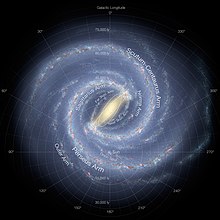Near 3 kpc Arm

The Near 3 kpc Arm (formerly also called Expanding 3 kpc Arm or simply 3 kpc Arm) was discovered in the 1950s by astronomer van Woerden and collaborators through 21-centimeter radio measurements of HI (atomic hydrogen).[1][2] It was found to be expanding away from the center of the Milky Way at more than 50 km/s. This spiral arm contains about 10 million solar masses of gas, mostly hydrogen atoms and molecules.[3] It is named for its distance (more accurately, 3.3 kpc) from the Galactic Center.[3] It is about 5.2 kpc from the Sun, and is located in the fourth galactic quadrant.[2]
The last attempt to search for star forming regions in the Near 3 kpc Arm (in 1980) showed little star formation occurring in the numerous molecular clouds of this arm.[4][5]
Along with the Far 3 kpc Arm discovered in 2008, these inner arms establish the Milky Way galaxy's simple symmetry.[4]
See also
[edit]References
[edit]- ^ Expansion d'une structure spirale dans le noyau du Système Galactique, et position de la radiosource Sagittarius A, Comptes Rendus de l'Académie des Sciences, Vol. 244, p. 1691–1695, 1957
- ^ a b A New Spiral Arm of the Galaxy: The Far 3-Kpc Arm, T. M. Dame, P. Thaddeus, ApJ Letters, 2008
- ^ a b Milky Way's Inner Beauty Revealed, Press Release Harvard-Smithsonian Center for Astrophysics, 2008
- ^ a b The Far 3kpc Arm NASA/Astronomy Picture of the Day, 2008
- ^ Star formation and ionization in the 3 kiloparsec arm, Astrophysical Journal, Part 1, vol. 241, Oct. 1, 1980, p. 200–207

